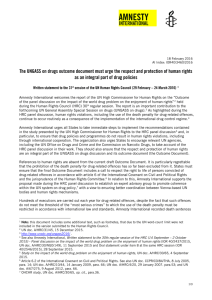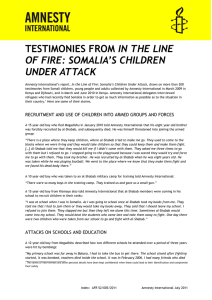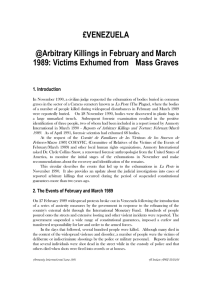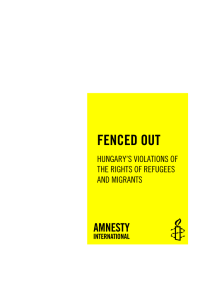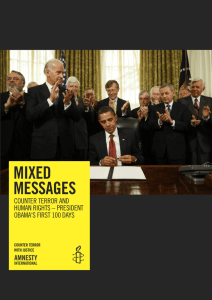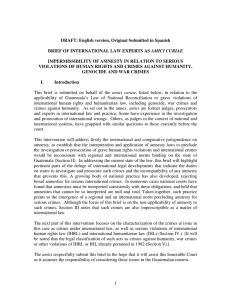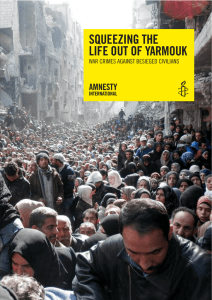PDF - Amnesty International
Anuncio
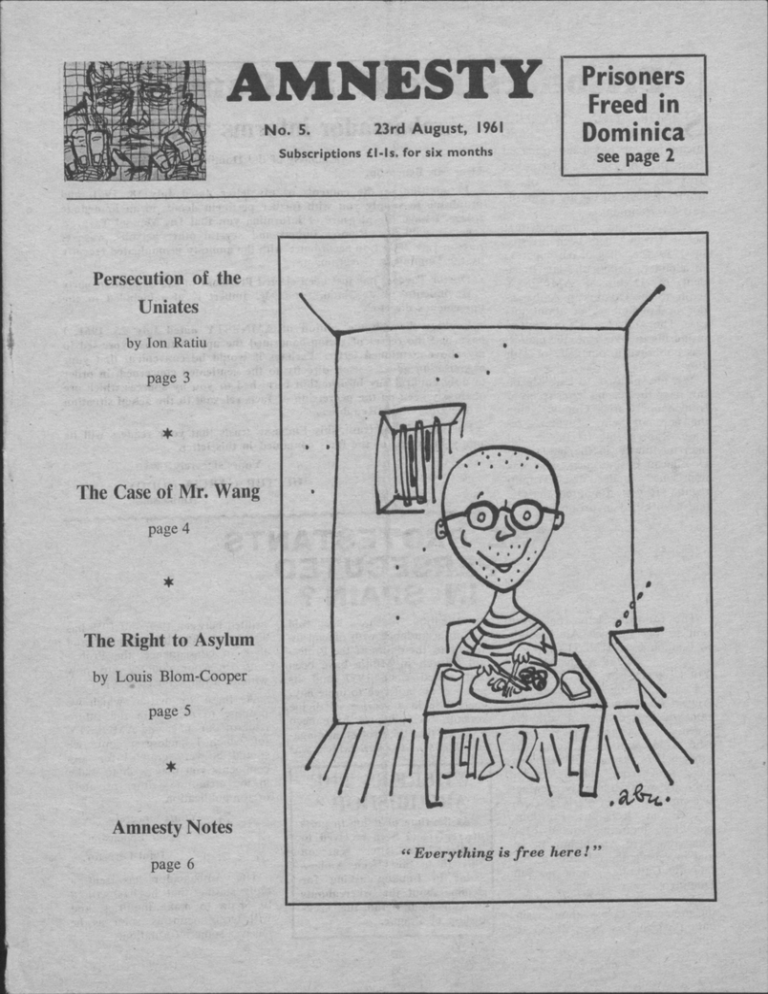
AMNESTY No. 5. Subscriptions 23rd August, LI-Is. Prisoners Freed in Dominica 1961 see page 2 for six months Persecution of the Uniates by Ion Ratiu page 3 .• • • The Case of Mr. Wang 0 page 4 0 • The Right to Asylum by Louis Blom-Cooper „ Page 5 Amnesty Notes page 6 " Everything is free here! " I Prisoners Freed in Dominica DomiMANUEL the noted TAVAREZ,DON SENOR nican lawyer has been released from prison. He was set free on July 26 under the terms of an amnesty decreed by the Dominican Government. After receiving information that Senor Tavarez had been arrested in 1959 for alleged participation in a plot to depose the late PresiAMNESI Y dent of Dominica, wrote to the Dominican Ambassador in London asking about this case. The Ambassador's first letter, promising to investigate the matter, was published in our issue of 25th July. We are pleased to publish on this page the second letter received from Senor Garcia Godoy, giving the news of Senor Tavarez's release. Ramon Imbert—the second man mentioned in the letter is a Dominican businessman, who was the Trujillo undcr imprisoned regime. It was rumoured that he had been killed in prison. Ambassadorinforms "Amnesty" Embassy of the Dominican Republic, London August 4, 1961 Dear Mr. Benenson, In addition to the contents of my letter dated July 18, 1961, and promising to supply you with further pertinent details in an immediate future, I have the pleasure of informing you that Dr. Manuel Tavarez, together with Mr. Ramón Imbert and several other persons, was set free on July 26 last, in accordance with the amnesty promulgated recently by the Dominican Government. Doctor Tavarez has just been elected President of the opposition party " Movimiento 14 de Junio," and Mr. Imbert is also included in the movement's directory. Looking through the edition of AMNESTY dated July 25, 1961, I have had the regret of seeing confirmed the apprehensions expressed in my above-mentioned letter. Perhaps it would be convenient that your organisation address itself directly to the gentlemen concerned, in order to duly confirm any information furnished to you by sources which are obviously keen on the perversion of facts relevant to the actual situation in the Dominican Republic. For the sake of truth, this Embassy trusts that your readers will be amply informed of the facts contained in this letter. Yours sincerely, HECTOR GARCIA GODOY, Ambassador. ARE PROTESTANTS PERSECUTED IN SPAIN ? The following letter has been sent to the Spanish Ambassador in London by AMNESTY:— 2nd August, 1961 YOUR EXCELLENCY, writing on behalf of Appeal for Amnesty, an organisation which is concerned with the freedom of conscience of those who hold political, religious or other beliefs. As you will probably have seen from our newspaper publicity we have already been active in holding in Paris a Conference on Religious Freedom, pursuing inquiries about the whereabouts of Archbishop Beran and in raising the question of the fate of Catholic priests in San Domingo. My purpose in writing to you at the moment is to ask about a situation which has been drawn to I am our attention. We have been told that, in accordance with official instnictions, the doors of the Protestant Church in Millila have been kept closed since 1957 and its members are not free to unite anywhere else in a service of divine worship. Secondly, we have been informed that the Protestant magazine Light and Truth which was WHERE IS THE ARCHBISHOP? At the time of going to press no reply had been received to letter sent on AMNESTY's July 10 to the Czech Ambassador in London asking for details about the whereabouts of Monsignor Beran, the Archbishop of Prague. 2 printed between 1956 and 1959 has since that date been banned and that, in consequence, the Protestants in your country are now without a magazine. As these are matters which we propose to discuss in the future issue of our magazine AMNESTY (of which I enclose a copy) we should be very grateful for any comments you may wish to make in the meantime—either privately or for publication. Yours sincerely, Peter Benenson, Joint Director. The Ambassador has sent a reply stating that he has written to Spain to make inquiries, and will write again as soon as he receives some information. Do states have hospitality? any general of obligation *SEE PAGE 7 This is what AMN ESTY is all about PERSECUTION OF THE UNIATES by ION RATIU author of "Policy utiu Hosu, the senior Cathoof Rumania, according to latest reliable reports, is crippled with artero-scelerosis, and lives under forced domicile conditions at the Curtea de Arges Monastery in a remote part of the country. He is in bad need of medical care, his health having been seriously undermined by thc many years spent in various government prisons from 1948 onwards. He was never tried, nor was there ever any charge formally brought against him. lic At 76, Bishop Hosu is an old and sick man and the chances of his ever regaining complete freedom, this side of the grave, seem slender. But his case is not exceptional. He is merely the most prominent surviving member of a small and comparatively unknown religious community now declared extinct by the " fiat " of the Communist Government of Rumania. Most of the 19 million Rumanians are Greek Orthodox. There and are hardly any Protestants, there is only a tiny community of Catholics of the Latin rite, almost all of whom live in Southern Moldavia. Apart from some 200,000 Rumanians of Jewish faith there is only one other important rethe Greek ligious denomination: Catholics or Uniates. According to official statistics there were, in 1946, about one and a half million Uniates. They owed allegiance to Rome and, doctrinfrom ally, were indistinguishable Roman Catholics, but they fol- for The West" lowed the Byzantine rite in the external observance of their faith. The origin of this small community goes back to the end of the I7th century when Transylvania came under the Hapsburg rule. With this change Catholicism became once again equal in status with Calvinism and Lutheranism. both of which had been greatly fostered in the immediately preceeding period by the Protestant In his princes of Transylvania. proselytising efforts, Emperor Leopold of Hapsburg made an appeal to the Rumanian people to join Church and thus the Catholic achieve equality with the other nationalities of Transylvania. This appeal was heeded and the Rome — hence with Union 1698 had many " Uniates "--of to the consequences beneficial 'Rumanian nation, the most important of which, in all probability, is the strong Western orientation of Rumanian political aspirations and culture. under came Rumania Once in 1945, Communist domination, the new regime did everything possible to reorientate the country Inevitably thc towards Moscow. with her close Uniate church, Western ties, camc under the axe. In no time very little freedom was left for the Uniates undcr the new dispensation. From 1946 to 1948 a sustained with mass campaign, punctuated arrests of priests and parishioners, even and torture persecution, In momentum. death, gathered 1946 there were 1.725 churches, (Continued 3 on page 8) known as organisation THE FOR AMNESTY I- APPEAL 1961, was launched by a group of lawyers, writers and publishers in London, all of different backgrounds, political attitudes and religious views. It aims for the release of all people, in whatever country, who are held prisoner for their opinions and their conscience, who are physically restrained from expressing genuine nonviolent views. It aims to build up in all countries a publicity campaign which will set a tide of opinion running in favour of_ all Governments—of whatever shade of opinion, in whatever part of the the world—guaranteeing freedom of men to express and practice their opinions their faiths, however opposed to their nation's Establishment. Membership of the founding group is reserved to those who are determined to ensure that the conduct of APPEAL FOR remains 1961 AMNESTY impartial — between wholly politics, parties, countries, ideologies, religions. Its aim is not to speak for non-communist prisoners in Communist lands, nor for Communist prisoners in other totalitarian lands, but to agitate for the rights of both—and, indeed, those who are neither. The Joint Directors are: Eric Baker, former Joint Secretary of the Quaker Centre in Delhi and Secretary of the National Peace Council in London; and Peter Benenson, who in 1956 took the initiative which led to the formation of " Justice," the all-party body of lawyers to uphold the Rule of Law. There is a tremendous lot more to be said about APPEAL 1961 that FOR AMNESTY cannot be said in this column. If you want to know more, as we hope you do, write to or Buildings Court Mitre 'phone London Central 7867/ 9429. Comment THE VALUE OF PROTEST Dominican the two That front Ambassadors. from issue letters " carries of "AMNESTY THIS Ambassador brings the excellent news that Dr. Manuel Tavarez has been released from prison under an Amnesty. Whenever a distinguished political or religious figure is arrested, it is current fashion for his sympathisers abroad to write letters of protest to the Embassies of his country. There have been so many letters of protest about so many people in the last few years that the currency has become rather debased. Embassies often no longer bother to take these protests seriously. The objektive of AMNESTY 61, through the use of this newspaper, is to restore the value of a Diplomatic Letter. We are doing this four ways. First, by deliberately refraining from publishing feature material about a prisoner until we have given the Embassy concerned time to check the allegations. Second, by giving the Embassy space in the paper to publish its Government's side of the story. Third, by publishing the Embassy's reply, or noting clearly its failure to reply. And fourthly, by phrasing our letters to Embassies, not as protests, but as inquiries for information. The last point is perhaps the most important—and may give some clue to the timing of Manuel Tavarez's release. No Government worth its salt is going to have its internal policy dictated by citizens of another country. And it is no longer compatible with the dignity of small countries, or with the growth of international institutions, for individuals or groups in a large country to intervene in the affairs of a small country. Indeed, continuation of this 19th-century European tradition is in part responsible for the strong feeling of " racial " solidarity among African and Asian states. What time-honoured tradition, written constitutions and good sense combine tolsanction a foreigner to do are two things. First, he is always, and properly, entitled to seek information from the Embassy about the whereabouts and welfare of a prisoner. Secondly, if a prisoner has been sentenced by a court, or is bsing held adminstratively without trial, a foreigner is entitled to write or cable, directly or through the Embassy, asking the Executive to show clemency. What the growth of international institutions since the last war permit a foreigner to do, is to deliver his to the appropriate intel national body. A growprotest ing number of international bodies concerned with the human rights, representingmembers of a religious faith, like Protestants, Catholics, Jews and Moslems, or professions like lawyers, writers, etc., have " Consultative Status " at U.N.O. (and on various other world organisations such as the I.L.O. and UNESCO), Protests to and representations by these international bodies are proper and often efficacious. AMNESTY, which has now become an international body, will shortly appoint Diplomatic Counsellors to take up individual cases at U.N.O., New York, Geneva and Strasbourg. Every judicial machine becomes clogged. The purpose of a Diplomatic letter to an Embassy inquiring about the fate of a prisoner is to encourage the Government concerned to speed-up the judicial processes. In this it is similar to the British institution of a Parliamentary Question. And we hope, judging by the tone of the two Ambassadorial letters published in this issue, that AMNESTY's letters of inquiry will eventually have the same sort of status. What will happen to Mr. Wang ? 4-NNE of the principal purof " Appeal for Vposes Amnesty " is to establish the right of asylum for those who fear that by remaining in or returning to their own country they would lose either their liberty or their life. Consequently the plight of Mr. Wang Shou-Kang, a refugee from General Chiang Kai-Shek's government in Formosa, aroused the immediate sympathy of AMNESTY, whose members, together with members of " Jus- AMNESTY Correspondent tice," have at once appealed on his behalf to the Home Secretary. At the time of writing there is every hope that he will be allowed to stay in Britain. Born in 1929, he and his family lived through the turbulent years of the thirties and the earlier 1940s on the Chinese mainland, driven from town to town, until in August 1948, he joined the Naval College in Shanghai, and of Technology with the college was evacuated to Formosa only a few months later. Nor has he since been able to 4 communicate with his family, the having authorities Kuomintang forbidden him to do so. In 1958 he was sent with other Formosan naval officers to the Naval PostCollege in California graduate where, in June of this year, he received his M.Sc. degree. But Wang Shou-Kang had learnt more than engineering science during his three years in the United to drive He managed States. across the States to see for himself what a free society looked like. His conclusion was that it was not the high standard of living which (Continued on page 6) Is a State entitled to refilse to admit certain people? *SEE PAGE 7 THE RIGHT TO ASYLUM by LOUIS BLOM-COOPER,legal correspondent of " The Guardian" gone have which line barricades the S0 up theacross divides the eastern and western of Thousands zones of Berlin. refugees have political potential of recording now been deprived votes with their feet, extheir cept at the risk of their lives. may be the rights and Whatever regime's wrongs of the Ulbricht off the East in sealing action from their countrymen Germans in the West the right of asylum pressing a more has become days turbulent these topic city of Berthe divided around who have those for both lin, and Curtain the Iron pierced for those who may hope to do so in the future. States have always reserved to grant to right the themselves they choose to anyone asylum without incurring any international Thus, the Canadian govliability. ernment has just accorded asylum to a Russian scientist who sought refuge in Canada. But States genethis have never exercised rally refugee power until the individual has set foot on the shores of the sought he whom from State Yet in two instances in asylum. recent years States have actively and even assisted in encouraged the wholesale departure of people from various lands to the haven of another state. The liquidation of the Diaspora has been a prime aim of the Israelis who have perpolicy for sisted in an open-door those who all Jews and particularly in still suffer persecution might their adopted lands. the is instance other The Germany of Republic Federal which has actively sought to provide room for all East Germans who could find their way out of the Eastern regions of Germany. Since the cnd of the war two and a half million people have left East Germany. of mass These are examples of asylum in pursuance application Trather philosophy of a political of an instituthan an application character. tion of a humanitarian Nevertheless it is beginning to demand new rules of international law concerning the right to asylum. The right to asylum is certainly not a right possessed by the alien to. demand that the State should and asylum. The grant protection of a number of Constitutions countries expressly grant the right of asylum to persons persecuted reason; article 16 of for political of the German the Constitution is one such Republic Federal lawyers example. But international such that agreed arc generally has not yet crystallised practice into a general principle of law. Declaration Even the Universal Rights, which in any of Human case is not a legally binding instrument. does not confer any such right. Article 14 of the Declaration lays down that " everyone has the in other right to seek and enjoy prosecufrom asylum countries It does not, therefore, contion." fer a right to receive asylum. So long as the rules of international law are ineffective to proor tect human right from political religious persecution it will not be possible to urge that the right to is part of interreceive asylum national law. One might hope that would set out States individually subject to of asylum, the right rewith necessary qualifications gard to the need to investigate the (Continued "The Spectator" The first and liveliest of the British weeklies Every Friday, 9d. 5 on page 7) AMNESTY NOTES Progress in Germany The German Sec ti o n of AMNESTY has already made good progress. It has registered its articles of association, as required by German law. Sub-sections have been started in Hamburg and Munich. Its headquarters will remain in Cologne, where its Director, Gerd Rugc, a well-known news commentator on Nordwestdeutscher Rundfunk, works. The Section plans its next meeting on 1st September, and has in thc meantime asked the Library in 1.ondon to supply six case-histories which can be publicised in the German Press. • • Globe-trotting 'the establishment of National Sections requires beforehand a visit from one of the International Secretariat. This is to ensure that those organising a Section know exactly what the international plans and objectives are, and, secondly, to insure that the new Section represents broadly all the main currents of political and religious opinion. From the beginning of September onwards Eric Baker and Peter Benenson will be making a number of visits to assist in the formation of National Sections. Eric Baker is going to Greece and Turkey. Peter Benenson goes to U.S.A. and to Italy in September, to Holland and Austria in October. There arc also plans to visit Scandinavia where support for AMNESTY is growing fast. Once is enough! A supporter in Aberdeen has written saying that it will be quite sufficient to send him AMNESTY once every six months; that will be enough to remind him to subscribe! But, the purpose of AMNESTY is not to solicit subscriptions. On the contrary, we want to give AMNESTY supporters news of how the movement is spreading, and in particular. to carry the sort of material referred to in the Editorial Comment. The movement can only be effective if it has an organ of publicity which circulates quickly and widely round thc world, keeping National Sections in touch with the others, stimulating supporters to use their own tongue and pen. Request from 'Down Under' During August the THREE'S in Britain are, inevitably, marking time; and even their hard-working organiser, Mrs. Margaret (Miff) Archer, has gone for a welldeserved holiday. But holiday-time in Europe is mid-winter in the other hemisphere. The office in London received its first request last week for three names for a group starting in Australia. CONVOYS LTD. Officially Appointed Travel Agents To " ODYSSEY " Head Office Bouverie Street, London, E.C.4. FLEet Street 4060 (15 lines) 21, Tothill Street, 17, Merton Road, London, S.W.1. Bootle, Liverpool 20 Trafalgar 5445. Bootle 4141. 6, Carlton Place, Worsley Road, Glasgow, C.5. Swinton, Manchester. Glasgow South 3325. Swinton 3221. 6, 6 THE CASE OF MR. WANG (Continued from page 4) impressed him so much as the fact that here was a people who "talked freely and lived without fear." Yet, even in the heart of this free society he could do neither. To make the journey across the States by himself had demanded some ingenuity; Formosan agents kept a close watch on Formosan students. Just how close was made clear to him when, during his first year in California, he fell in love with a Formosan girl who herself had emigrated to the U.S. a couple of years before, with the intention of eventually qualifying for American citizenship. He knew that to marry without the permission of the K.M.T. authorities would be to invite punishment: at the same time it was made clear to him that permission would not be given even if he applied for it. The K.M.T.. however, were by now becoming increasingly suspicious, and their constant surveillance made life unbearable both for himself and his fiancée. In January 1961 they crossed the border into Mexico and, during a stay of only a few hours were married secretly. On 1st June he received his Masters' Degree and was ordered to report to a transit camp for repatriation to Formosa. On 6th June he was given his Formosan passport, in preparation for travelling on 7th June. But instead, Wang Shou-Kang walked out of the transit camp and for the next three weeks he and his wife, living in constant fear of K.M.T. agents, sought help in finding some country where they could " live without fear.Canada refused point-blank to offer asylum —the chances of finding it in the States seemed slim; Denmark, Sweden and Israel when approached all said it would take time—a long time—to reach a decision. On 13th July Mr. Wang was served with an order to leave the U.S.A. within two days; this was however extended, and on 24th July he left by air for London. He has been granted permission by the British Government to remain in England until his application for asylum has been decided. Behind the Scenes INVASIONIN MITRE COURT E`OUR or five times a week is 1 Mitre Court Buildings when happens This invaded. live-wire librarian, AMNESTY's (Chrystel) Christiane Mrs. Marsh, comes to work. Often she has her family of two sons ages 11-20, and two daughters, in tow. M rs. Marsh is the right person for the right job. As she carried on with her immense task of reading the world's newspapers for information about the thousands of she persons unjustly imprisoned told me something of her own background. 100 km. Born in Magdeburg, west of Berlin and now in the Eastern Zone, she left Germany on the 29th June, 1939. " I left to get married," she told was me, " but my departure speeded up. I had been arrested, together with two friends, by the Gestapo. The other two were imprisoned for nine months but after three hours of continuous crossquestioning I was released, since. according to the Gestapo, I was ' too young, too stupid and only a girl.' " There was no doubt about her answer when I asked her why she was willing to give so much time entirely without any financial reward. she said " that there " I know are many things in the world to worry about, but if only people could realise the magnitude of this problem they would be shaken. We now have information about 400 prisoners and only lack of volunteers and time prevents this list from growing faster than it does. If people begin to see the sheer numbers they would be shaken out of their apathy." JOHN PELLOW. Is a State'obliged countries? do you think ? What already announced in an earlier issue, a conference is to be held frontiers of freedom." The task of the participants will be to attempt to formulate answers to the following five questions:— What methods may a citizen legitimately employ to change his Government or its policy? What are the legitimate limits to the free expression of opinion? What are the legitimate limits of civic exemptions or privileges based on conscience? What obligation has one state to admit the citizens of another? Is the state ever entitled to deprive a citizen of his nationality, or to withdraw its protection from him? As a guide to participants, questionnaires posing the main problems involved in each of these issues have been prepared at AMNESTY headquarters. Some of the questions relating to the right of asylum (question 4) appear on various pages in this issue. Your comments on these questions will be received with interest at AMNESTY headquarters. Let us know what yon think should be the answer. A full questionnaire will be sent to you on request. Please write (or phone) to APPEAL FOR AMNESTY 1961, 1, Mitre Court Buildings, London, E.C.4. Tel.: CEN 7867/9429. A s. in Holland at the end of December to discuss the ' The Right to Asylum (Continued from page 5) validity of a claim to be a political or religious refugee. There is, however, an urgent need that States should establish by convention the right of the individual to seek and enjoy asylum and to set out rules under which individuals should be free to exercise those rights, even though States ultimately can deny the right of the individual to receive asylum. The resolution of the Bath meeting of the Institute of International Law in 1950 imposes upon States the with other duty of consultation States whenever wholesale admission of political refugees is morally obligatory. This resolution, doubtless, was an expression of the overriding of the sanctity of considerations human life and freedom over the political and economic considera- to admit unemployed 7 tions of the State receiving political refugees. But if this principle of applies to mass movements refugees it should be equally if not more applicable to the individual refugee. A political prisoner might be able to wring a concession out of his government that he should be allowed to seek asylum in a foreign land. In those instances States should be under an obligation to consult with other States about the of possibility of the conferment States consulted The asylum. should be in turn obliged to consider the application. Applications for asylum should not be confined to the case where the political prisoner has been able to set foot on the soil of the receiving country. In many instances it is impossible for him to leave his country of imprisonment and yet his right to seek asylum should not depend on the fortuitousness of his plight. people from under-developed *SEE ABOVE PERSECUTION OF THE UNIATES (Continued from page 3) 34 1.771 priests, 75 arch-priests. canons and 6 Uniate bishops. They were exhorted and appealed to by the Orthodox Church. at the instigation of and with strong backing from the Communist Government, to sever their links with Rome and re-enter the Mother Church. line inspired officially The the fact " that " the stressed Union of 1698 was imposed upon the Rumanian people by the Hapsburg overlords. " Now," the Communist agents stated, " there is. for the first time, complete religious freedom in Rumania so that the Rumanian people can eliminate the shameful act of union from the annals of history." At first there was no response at all, but when the re-union campaign got under way and physical coercion was brought to bear on the unfortunate priests, a few of them agreed to sign an act of reunion. which enabled the Government to issue, on the 1st DecemNo. ber, 1948, the Decree-Law 358, by which (a) all the instituCatholic the Greek of tions (Uniate) Church ceased to exist, and (b) the entire property of any to these belonging description organisations were confiscated by the state. Almost all the Uniate priests have, at one time or another, passed through communist prisons. It is reported that some 500 of them are still in prison today. The others are forbidden, under heavy penalties, to say liturgy or to perform the sacraments. hierarchy Uniate entire The opposed this forcible re-union and accepted the consequences, which or prison invariably, meant, banishment to remote monasteries where they were given forced domicile. All six Uniate bishops remained loyal to their consciences and to their vow of allegiance to Rome. They were tortured and Four are known to imprisoned. have since died. Published by Appeal Are You Helping? of If AMNESTY is to be effective as an instrument for the achieving it must greater political liberty it must have a wider circulation—and be solvent. in a Many of you who are reading this will already have sent more Y AMNEST get us help to you ask We paper. the subscription to if you widely read. Mention it to your friends—mention it to strangers other have the opportunity, circulate it or leave it somewhere where coupon the up filling by now something do can You it. read will people below with the names of people whom you know would be interested in AMNESTY. we We have ourselves circulated the paper on approval to those guinea thought might take a subscription. We now ask them to send in a and in return they will receive AMNESTY until the end of the year. This As the weeks pass so the quality of the paper will improve. ed distinguish a , statesman a by features carries fortnight's issue already scholar and some well-known journalists, not to mention Abu. Will you help us to stay alive and grow? To : AMNESTY, 1 Mitre Court Temple. London, E.C.4. Buildings, *I enclose LI 1s. as my subscription to AMNESTY for six months. Cheque/P.O. *1 am sending the names and addresses of the following people who I think would like to receive AMNESTY regularly. 1 3. My name is Address * Delete if inapplicable. and produced in the U.K. for Amnesty 1961, 1 Mitre Court Buildings, London, E.C.4, London. E.C.4. Co-operative Printing Socicty Ltd., (T.U.). 7-11, Tudor Street, for the publishers by the
